My story begins in a family with parents who loved me, supported me, cared about me, and were conscientious with their parenting. I know how valuable that is. Many people I know would be deeply grateful to have parents like mine, and I am most certainly grateful! But as in all families, there was a dark side. My parents were also rigid, unbending, and harsh with discipline to the point of clear abuse. There was a demand for absolute compliance that I learned to meet in order to survive. I was supported as long as I was “good.” If there was a family code word, it was “responsibility.” Most everything was black and white, all or nothing. I became a compliant, high-achieving child and adolescent.
Church was a big part of our family life. I was raised in a country church full of beautiful, unassuming, good-hearted people in Southern Oregon. The theology and the culture of the church strengthened the rigid, unbending demands for certain types of behavior—perfection, compliance, obedience, and responsibility.
This church also happened to be pastored by someone who had publicly confessed to molesting his teenage foster daughter. How he did not end up in prison is still a mystery to me. When I was 16 years old, this pastor caught me alone and kissed me on the lips on at least four different occasions. I was young, confused, uncomfortable, and unsettled by it, but didn’t say anything to anyone until years later. The church’s response to the story of his foster daughter communicated to me as a 16-year-old that no one would take what happened seriously. Their loyalty was with the pastor. This clear sexual violation was a gross trespass on my soul. In my developing mind, it normalized this behavior, which paved the way for more sexual assault by clergy years later.
In 1982, I moved to Portland, Oregon, to attend a well-known Bible college. I was not even quite 18 years old. During my last year of college, I started attending a church that I absolutely fell in love with. The church quickly became the complete center of my life, ministry, heart, and social network. I gave it my blood and my soul, and I passionately believed in the church’s mission and vision.
But there was a dark side to the church. Despite its outward appearance as a cool, “happening,” visionary church, it was strongly patriarchal, conservative, and rigid at its core. The elders and the pastors were the same unit of leadership. There were no checks and balances—no place to question, no recourse if someone disagreed. They took pride in their “church discipline” theology, and public discipline took place regularly. This all seemed normal and reasonable to me at the time. I happily gave everything for that church.
The second week I attended, I struck up a conversation with one of the pastors. I expressed my interest in the unique things the church was doing, and he invited me to make an appointment with him. We became friends. He took me under his wing and became a kind of “second dad.” He was 18 years older than I was, married, and father to several kids. I quickly realized he was a powerful personality; people did not want to cross him. He gave me favor in the church and facilitated my desire to go overseas in a full-time mission capacity. I didn’t think anything was amiss for the first five years.
In year six, it became clear that he was making sexual advances. He then sexually abused me for nine months. Throughout those months, he told me that I couldn’t get out of the relationship because he was unstable emotionally and would kill himself if I left or told anyone. It also became evident that he was an alcoholic.
My co-dependent, over-responsible, “Christian” rescuing tendencies that had been there since childhood went into overdrive. I was trapped. I made a (very sad and very sick) decision that I would rather my life and future be destroyed than risk his suicide if I talked to someone, got help, and left the relationship.
So I stayed. My emotions swung between extremes the entire time. I hoped that church leadership would help me find clarity and protect me from the abuser, but I was terrified that if I told the elders I would be blamed and held completely responsible. The “good girl” inside of me was programmed to take responsibility for what had happened between us, but deep down, I felt manipulated and entrapped. My sense of responsibility and black-and-white religious worldview painted a picture of an emotional affair, but my wiser self suggested that all the traumatic symptoms I was experiencing didn’t add up to an emotional affair. The confusion was excruciating. After nine months of entrapment in the abuse, I quit my job and went home to Southern Oregon.
Three weeks after I left for Southern Oregon, my sexual abuser left Portland. In a letter mailed to the elders and pastors of the church and copied to me, he revealed that he had abused me and asserted that I was in over my head with the situation.
When I received the copy of that letter, I immediately got in my car and took the five-hour drive to Portland to face the elders. I hoped for protection, clarity, and help. Instead, I ended up in that basement room, waiting for judgment, nauseated, utterly terrified, and almost incoherent.
Without my sexual abuser to confront, the elders made me the focal point of their anger, hurt, and outrage. Most of them told me how angry they were with me. One told me that I was a threat to every married woman. They all agreed that I should permanently move back to my parents’ home in Southern Oregon. My life, my work, my best friends, my entire social network was in Portland. It was understood by all that to go against this “suggestion” would be proof of an “unrepentant and rebellious heart.” I was also expected to give public confession of my “sin” in each of two Sunday services so as not to be put under formal church discipline.
The years bring clarity, and as I look back at that day, I realize that the worst part of that Sunday morning was not speaking the words of confession. It was standing in front of 500 people I loved and confess that I had torn a marriage apart. This was the last time these people would see me; their last memory of me would be that I was a slut. All the good I’d done, all my investment in their lives and the church, my whole legacy would not just be neutralized, but destroyed. The last thing people would remember of me was this public flogging and dismissal. It was my “scarlet letter” moment, and I understood that, like Hester Prynne in the classic novel, I needed to hold my head up high and maintain whatever dignity I could.
I also now understand even more clearly why the elders wanted me out of the way—so that the pastor (my sexual abuser) and his wife and family could recover and be supported by the church. It was convenient to blame me due to my gender, marital status (single), age, and compliant personality. Though I desperately wanted to tell everyone that I never wanted this to happen, I felt trapped and without recourse, so I complied with their expectations and took responsibility for my “sin.” After 28 years, I now see that only about 25% of the damage done to my soul and spirit came from the sexual abuse by the pastor; about 75% of it came from my experiences and interactions with the elder board and its judgment and betrayal.
I packed my small car with everything I owned and moved back to Southern Oregon to my parents’ home on my 26th birthday. It is hard to describe the extent of my brokenness and confusion over the following months. My reputation and identity had been completely shattered. I had no idea who I was anymore. I grieved the life I had been forced to leave. I had lost my best friends, my social circle, my future career plans, my innocence, my reputation, my very self. Panic attacks and suicidal depression plagued me for months.
In the years that followed, I still had no idea what happened to me. Hardly anyone was talking about spiritual abuse in 1990. It took me three years to even realize that I had been sexually abused. The turning point came when I read a prominent book of that era that outlined perfectly the grooming, abuse, and entrapment that structure sexual abuse. That was the beginning of healing for me.
The following seven years consisted of fighting for physical and emotional survival, participating in individual and group counseling, and, finally, beginning to heal and thrive. Seven years later, I even found the strength and courage to return to talk to the elders about what had happened and its impact on me. I expected nothing from them. I needed nothing from them. I retained a small strand of hope that they would somehow see the truth of the damage they had done. I did not want it repeated with anyone else, ever. I was gracious and kind, but very direct. Unfortunately, only one elder out of the original six chose to hear and truly understand what happened.
The memories surrounding the day that I gave my public “confession” are still some of the most brutally painful and vivid of my lifetime. I remember some aspects of that day with perfect clarity. Several years ago, I wrote a poem about preparing for that moment.
Say It with Your Best Dress On
Put on your best dress,
It is all you have left.
A last scramble for dignity
A last shred of humanness.
A dress that covers
Your public stripping.
Today you will stand alone.
Exposed.
Without a trace of protection.
The dress feels so threadbare,
Practically invisible.
My deeply private
Confusion and sin-filled horror
Given public air.
Look in the mirror, Connie
Make it a good hair day.
People will notice today.
This is what you are leaving them.
Make it a good hair day
Because the last several years don’t matter.
This is your new identity.
This – your powerful, publicized shame
Will be what they remember.
Put on your best dress, Connie
The new white one with the blue flowers.
(Why does the fabric feel so thin?)
Because today you will be
Sunday dinner conversation topic in every home
Motives questioned
Life analyzed
Heart dissected.
Put on your best dress
And make it a good hair day
Because you will lose it all today.
But you can lose it
With the last shred of human dignity
That can be brought to bear.
Your body and mind are broken
But today your spirit will be set free
And your tortured conscience finally appeased.
Set your face like a flint
And keep your back straight, Connie.
You are taking an unalterable route
Toward release from bondage.
Walk the long, exposed aisle to the front
Alone
And stand very still
As you find your voice
And composure enough to begin.
Look them straight in the eye
And say it all
With your best dress on.
I’ve come a long way from that basement room. I married and became a mom. I became a mental health therapist in 2004. I’ve done the roller coaster ride of major faith shifts and sorted out (sometimes with counseling, sometimes with mentors or friends or my trusty journal) the catastrophic damage done to me emotionally, mentally, physically, and spiritually as a result of the religious abuse. And I have healed! Each of the damaged and destroyed areas has been transformed by goodness and grace. I now have the privilege of walking with those whose lives have been injured or broken at some point by spiritual abuse.
How I wish that sometime during those seven years, someone could have helped me sort through what had happened to me! I received counseling for the sexual abuse, but no one really understood or was able to name the damage I had been through with the church. No one was able to help me understand the damage in my relationship with God, the utter confusion and spiritual deadness that followed me for years.
As I worked with more and more survivors of religious abuse, I realized that there was a need for structured religious abuse recovery materials. I began by teaching seminars for survivors, but as I became increasingly aware of the scope and breadth of the problem, I came to understand that the mental health field simply needs more material to address this issue. The understanding of the dynamics of spiritual abuse recovery is still in its infancy. I needed to put words around the abuse and recovery process. I want survivors to find recovery, hope, healing, and the strength and grace that I have found. I never want anyone to walk through that kind of brokenness alone again. It has been my lifelong goal to ensure that no survivor of religious abuse feel as isolated as I did.

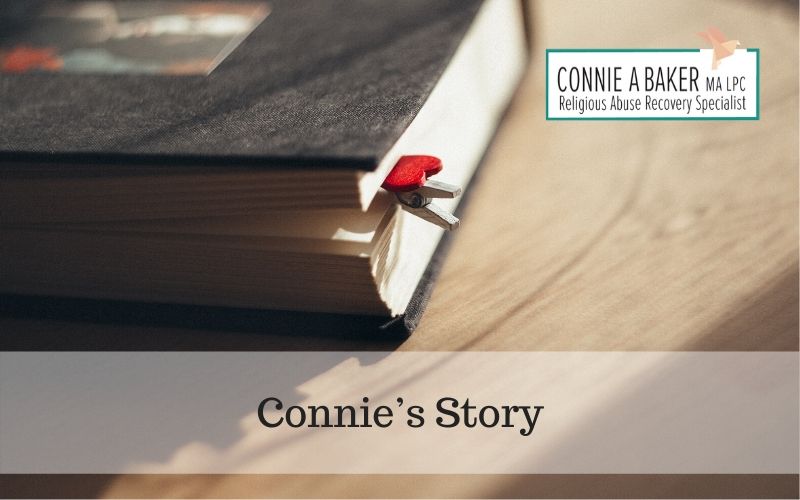

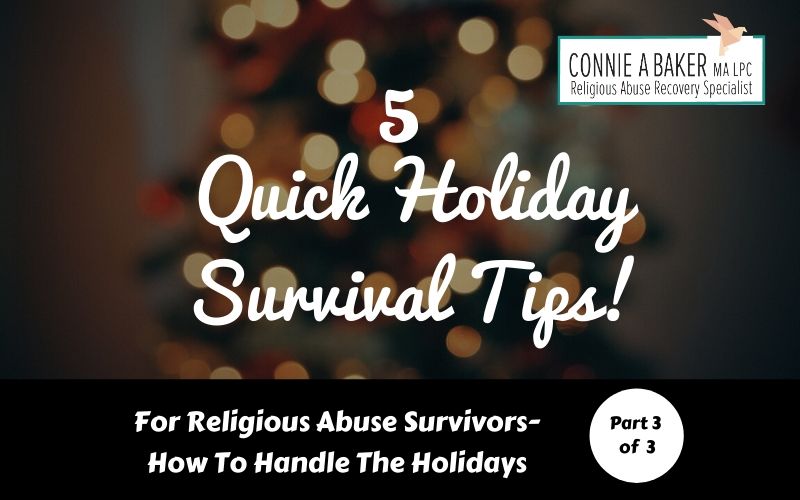
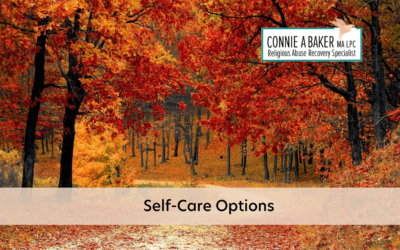
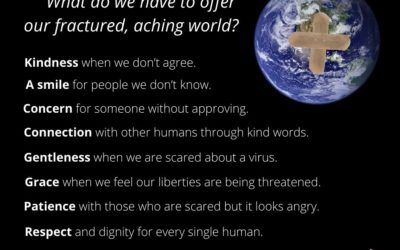
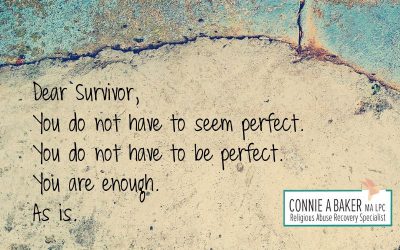
Oh Connie! I couldn’t finish reading your story yet as I am not in a place I can cry openly. I have just left my second marriage and third abusive relationship. I am in counseling to understand how to protect myself moving forward. One contributing factor was definitely an overly harsh and legalistic religious upbringing. I relate to so much of what you have written. Thank you for sharing your story!
Aloha Connie,
I appreciate your openness and shared wisdom, I am Amelia, Yogini nurse and survivor. I’m making a video to empower victims to combat DARVO, and share our stories. In the video I will be exposing the abusers in my family, who have not been held accountable. Do you know of any resources available to aid victims who wish to share their story? I do appreciate sharing if available.
Warm blessings,
Amelia Herold
Yes, check out this blog post, it has 3 parts. telling our story is an important part of healing. https://connieabaker.com/6-reasons-why-its-ok-to-tell-my-story-of-abuse-even-if-it-causes-someone-else-pain-part-1/